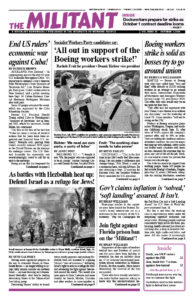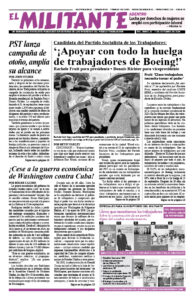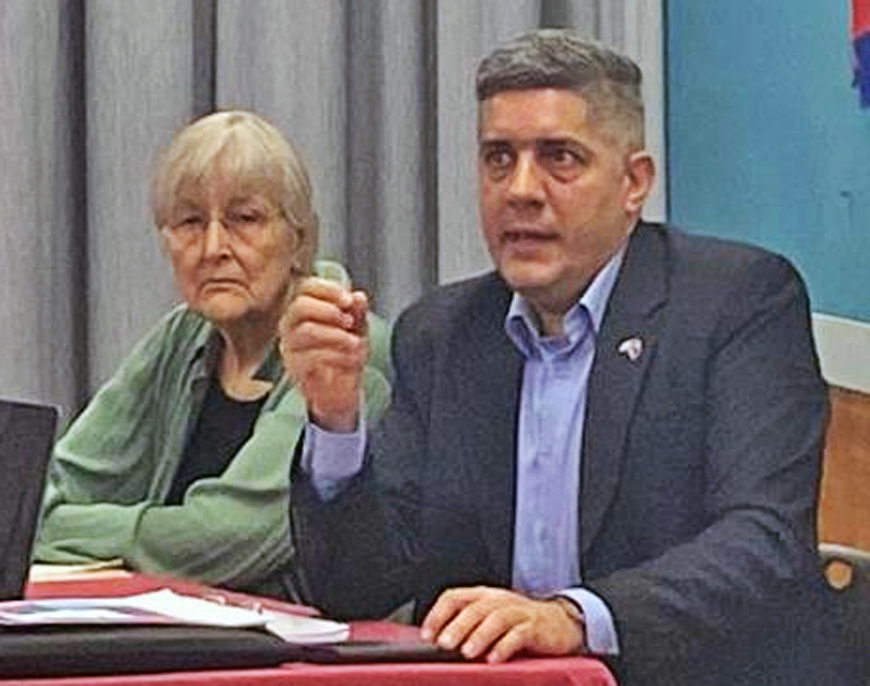AUCKLAND, New Zealand — In campaigning against the over 60-year U.S. economic war against Cuba, “it’s important to demand Cuba’s removal from Washington’s State Sponsors of Terrorism list,” Luis Ernesto Morejón Rodríguez, Cuba’s ambassador to New Zealand, told a public meeting here Sept. 14. Cuban Embassy Consul Hortensia Rodríguez Martínez also took part.
Some 30 people attended the event, which was organized by the Cuba Friendship Society.
Former U.S. President Donald Trump added Cuba to Washington’s “Sponsors of Terrorism” list in January 2021, which his successor, Joseph Biden, has continued.
This flies in the face of the fact that “Cuba has been a victim of terrorist actions that for years have been organized and financed from U.S. territory,” Morejón said, quoting from Cuba’s recently released 2024 report to the United Nations on the damage the embargo creates. The U.N. General Assembly has repeatedly, and overwhelmingly, voted to call for an end to the embargo.
Being put on this list deepened the embargo, Morejón said, including placing further curbs on Cuba’s access to credit, a necessity for international trade. Now cash-strapped Cuba has to pay upfront for many more sorely needed goods on the capitalist world market.
Morejón recalled that when he opened a bank account as a new ambassador in New Zealand early this year he was told, “You cannot send or receive a single penny to or from Cuba” or the bank would face penalties in its U.S. operations. “Many of our embassies face difficulties in banking.”
Deepening attacks on tourism
Another “terror list” measure targets international travel to Cuba, which is already barred to millions of U.S citizens. Now non-U.S. visitors to Cuba are denied visa-free travel to the U.S.
As of April this year, more than 300,000 European citizens had their access to the United States Electronic System for Travel Authorization restricted after taking a trip to Cuba.
Morejón said this and penalties on cruise ship companies plays a key part in the slow recovery of Cuba’s tourism — historically an essential source of foreign exchange — from the slump it suffered in the COVID-19 pandemic. While almost 4.3 million people visited the island in 2019, only 1.6 million came in 2022.
“The United States says the Cuban government alone is responsible for our very difficult economic situation, but it is not true,” Morejón said, emphasizing the deep impact the embargo has on the daily lives of Cubans.
Because of shortages of flour caused by the embargo, Cuba announced it had to cut its subsidized daily ration of bread by 25% Sept. 16, from 80 to 60 grams, reported Reuters.
Washington imposed the embargo in the early 1960s in response to the socialist revolution led by Fidel Castro. Millions of Cubans joined in a mighty land reform, a nationalization of both U.S. and Cuban capitalist-owned companies, a far-reaching mobilization that eliminated illiteracy, and other measures that transformed the country and its people. Before the revolution, in the rural areas 85% lacked running water and the vast majority did not have electricity, Morejón said. With the revolution, Cuba established “a very different social and economic system from its neighbor 90 miles to the north.”
Cuba’s internationalist foreign policy, based on solidarity with struggles for independence and freedom, flows from this course, he said. He pointed to the mobilization by hundreds of thousands of Cuban volunteers who fought in Angola’s wars in the 1970s and ’80s against invasions by apartheid South Africa.
Aiming to cause economic collapse and counterrevolution — the stated goal of U.S. policy toward revolutionary Cuba — Washington has increased the extraterritorial character of the embargo, Morejón said. They’re not only blocking U.S. trade with Cuba, but also pressuring foreign countries and companies to fall into line.
Given the increasing impact of these restrictions, “there is no way to find the resources to buy what we need abroad,” he said. For example, “Cuba could produce 80% of the pharmaceuticals we need, but we lack the raw materials.”
The drop in Cuba’s foreign earnings means the government must carefully ration fuel use, the ambassador said, in the wide-ranging discussion. Trash often festers longer in the streets since there is less fuel to power sanitation trucks. Fumigation workers with fuel-hungry sprayers cannot match the breadth of former preventative campaigns to kill disease-carrying mosquitos.
“We appreciate the solidarity of everyone around the world,” said the ambassador. He urged participants to join in the 10th Asia-Pacific Regional Meeting of Solidarity with Cuba, scheduled to take place in Beijing Oct. 28-31.


